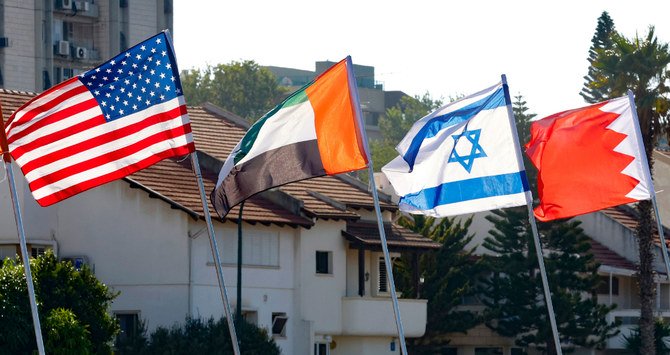Israel-UAE Peace is the first block against Russia and China ambition in MENA
by Dr. Frank Musmar and Irina Tsukerman
The peace agreements between Israel and other Arab and Muslim states can address some of the economic and political concerns which made Russia and China’s influence seemingly unavoidable.
The uprisings (The Arab spring) that erupted in the Middle East and North Africa (MENA) in 2011during the era of former President Barack Obama created a power vacuum in MENA due to President. Obama’s choice to signal the U.S resources and commitments away from the region. Moreover, Obama’s 2015 decision not to intervene in Syria was the official American strategic disengagement from the Middle East. As a result, Moscow starts its campaign for intervention in Syria in 2015.
Moreover, Obama’s era extended the disengagement of the U.S into a global withdrawal, which contributed to the weakening of the international order created at the end of the Cold War. The depreciation of the western impact led by the United States opened the door for China and Russia to compete in MENA and global affairs.
In 2018, President Donald Trump backed a plan to offer a Middle East Security Alliance (MESA) or Arab NATO to stand against the growing influence of Iran in the Middle East. However, from day one, it was rife with controversy over various issues, starting with membership – and at the time, Israel was not yet openly considered. The Israel-UAE normalization agreement is changing the scenario that once did no foreseen vital for MENA; Israel becomes an ally with the potential for more Arab States to join peace proposal with Israel and revive the MESA project. MENA countries must realize that Iran is not the only threat they are facing; Russia and China are becoming a major key player in the area and set to take the place of the United States as the dominant power.
China will object MESA (a formal decree of alliances) because China’s ambition to expand its influence in MENA is driven from the necessity to sustain its economic growth through building economic ties to support China’s efforts to achieve energy security. Furthermore, the Chinese goal is to foster a world driven by the bilateral relations of states, which creates advantages to sustain a broader economy and populous power without the need for formal allies.
Russia’s MENA policy is slightly different than China’s policy in MENA. Besides the direct intervention in Syria, Russia incorporates a nonintervention policy that is attractive to the region’s autocratic regimes and opposes the Western-style liberal democracy. The Russian approach is a de-ideologies approach that reflects on Islamic interest. It uses assistance in long-term loans in the construction of nuclear power plants as well as arms supplies.
Russia has claimed that its military campaign in Syria is a self-protective strategy against the expansion of radical Islamism as well as a catalyst for a future solution to the conflicts in the Middle East. In reality, however, the strategy was aimed at securing naval bases in strategic locations, positioning Russia as a critical power broker, and forcing the remnants of American influence out of the region. Russia’s presence in Syria made Israel’s life more difficult because Israel has to consider the Russian factor while responding to the Iranian threats in Syria. Russia’s flip-flap policy working with Assad and pro-Iran proxies on the one hand, and cut deals with Turkey, on the other hand, created radical militias that fell under Erdogan’s influence and established an organized presence in Syria. Russia’s airstrikes have ended up targeting U.S. allies in the region and resulted in an avoidable mass civilian casualty. Russia’s presence in the Middle East has been less beneficial than it was unavoidable.
The Israel-UAE normalization agreement will encourage the proposed MESA partners, Egypt, Saudi Arabia, and Bahrain, along with other MENA countries, to reconsider the proposal seriously rather than stays distracted by differences and short-term goals that are limiting their strategic interests and global security. The latest normalization agreement declared Israel’s military and economic position, which will open the doors for a MENA alliance (not an ARAB NATO), a military, security, and economic alliance.
In reality, Russia is also an economic competitor to Saudi Arabia in regards to oil and Qatar over LNG. Losing the oil war to the Saudis in the first quarter of 2020 was a stumbling block for that competition; moreover, Russian propagandists have been increasingly siding with the Houthis in Yemen and using active measures to sow discord between Saudi Arabia and Jewish and pro-Israel activists on social media. Israel, Saudi Arabia, UAE, and Bahrain do not perceive Russia and China as mere trade partners, especially after their role in siding with Iran at the U.N. Security Council to prevent the extension of the Iran arms embargo.
Furthermore, Russia preferred to lose a far more lucrative trade with the United States over pushing the sale of its untested S-400 defense system to regional powers in a risky proposition for most states, a step that may not ultimately live up to its reputation. For Israel, dealing with Russia is a matter of maneuvering, erasing the edges, and deconflicting wherever possible; Russia’s small GDP makes it a limited trading partner. Individual deals with oligarchs may be of interested to various private parties but are not a substitute for a formal relationship.
China has been entering the Middle Eastern markets slower that Russia, primarily due to the fraught with the radicalization nature of the area that is associated with political risk and problems. Being a top oil trading partner for Iran and helping Tehran evading sanctions in various ways makes Beijing inherently suspect in the eyes of the Middle Easterners; its recent willingness to allow its companies to utilize Al Jazeera propagandists in their ads was also an economic turn-off.
Beijing’s most significant value came as a threat of a deterrent by Saudi Arabia and others aimed mostly at U.S. Democrats and vociferous critics of U.S. defense relationships with the Gulf States; big markets made the country potentially desirable as a trading partner. However, on a strategic level and without considering the head of media-advanced narratives about the future of the relationships between Arab states and democracies, China’s self-serving, vicious economic and political position is becoming a turn off even for the countries once dependent on its largesse, including Sri Lanka, and various African states.
Beijing’s unwillingness to employ locals in the countries where it operates, a reputation for the low quality of its finished products and investment overextension that has led to its inability to support its signature project, the “New Silk Road” or the Bridge and Road Initiative (BRI) are red flags against long-term engagements. While Israelis have been willing to overlook China’s propaganda efforts and willingness to employ traditional totalitarian tactics abroad as much as at home, the growing Cold War between the United States and China has forced a reevaluation of contemplated national deals, such as the sale of a port which would have advanced Beijing’s maritime plan a step further.
The peace agreements between Israel and other Arab and Muslim states can address some of the economic and political concerns which made Russia and China’s influence seemingly unavoidable. Israel could be another bridge to a stronger relationship with the United States; furthermore, its leadership in innovation can make Russia’s and China’s roles increasingly superfluous. Of course, not to ignore Israel’s leading role in advanced weapons and various forms of defense systems, which can serve as a preferable alternative to Russian and Chinese offerings even in the event the defense relationships with the U.S. go sour.
At the end of the day, as countries are increasingly forced to choose sides in the new Cold War, Israel’s peacebuilding in MENA can help the United States advance its goals in limiting Russian and Chinese influence because when push comes to shove, Israel will choose its friendship with the United States over its pragmatic relations with China.
Irina Tsukerman is a Human Rights and National Security Attorney based in New York. She has written extensively on geopolitics and US foreign policy for a variety of American, Israeli, and other international publications. She can be followed under @irinatsukerman.
Dr. Frank Musmar is an expert on the Middle East Politics, a Non-resident research associate at BESA Center and an Advisory Board Member at the University of Maryland Global Campus (UMGC).



